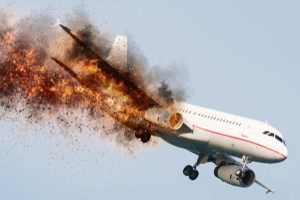
Aviation accidents can occur in various forms, each presenting its own unique set of risks and challenges. Here are some of the common types of aviation accidents: Commercial Airline Accidents: These accidents involve large commercial aircraft, such as passenger planes operated by major airlines. Commercial airline accidents can include incidents during takeoff, landing, or […]

Types of Aviation Accidents
Aviation accidents can occur in various forms, each presenting its own unique set of risks and challenges. Here are some of the common types of aviation accidents:
Commercial Airline Accidents: These accidents involve large commercial aircraft, such as passenger planes operated by major airlines. Commercial airline accidents can include incidents during takeoff, landing, or mid-flight, and may involve factors like pilot error, mechanical failures, or extreme weather conditions.
General Aviation Accidents: General aviation accidents involve smaller aircraft, including private planes, helicopters, and small charter flights. These accidents can result from various factors, such as pilot error, mechanical malfunctions, inadequate maintenance, or poor weather conditions.
Helicopter Accidents: Helicopters are widely used for various purposes, including transportation, emergency medical services, and aerial work. Helicopter accidents can occur due to factors like pilot error, mechanical failures, inadequate maintenance, or unsafe landing conditions.
Military Aircraft Accidents: Military aviation accidents involve aircraft used by the armed forces for training, combat operations, or other military purposes. These accidents can result from factors like pilot error, equipment failures, mid-air collisions, or hostile actions.
Air Traffic Control Errors: Aviation accidents can also occur due to errors or miscommunications by air traffic controllers. These errors can lead to mid-air collisions, runway incursions, or other dangerous situations where aircraft are unable to maintain safe separation.
Runway Incursions: Runway incursions happen when unauthorized individuals, vehicles, or aircraft enter or cross active runways, posing a serious safety risk. These incidents can result from miscommunications, pilot or controller errors, inadequate signage, or faulty runway lighting.
Bird Strikes: Bird strikes occur when birds collide with aircraft during flight or takeoff/landing. These incidents can cause damage to the aircraft’s engines, windshield, or other critical components, potentially leading to accidents or emergency landings.
Unmanned Aircraft System (UAS) Accidents: With the increasing use of unmanned aircraft systems, or drones, there is a growing risk of accidents involving these devices. UAS accidents can result from operator error, equipment failures, or non-compliance with airspace regulations.
It’s important to note that the causes of aviation accidents can be complex and multifaceted. Investigations by aviation authorities, such as the National Transportation Safety Board (NTSB), are typically conducted to determine the underlying causes and contributing factors of accidents in order to improve safety measures and prevent future incidents.
The National Transportation Safety Board (NTSB) plays a crucial role in investigating aviation accidents to determine their causes and make recommendations to improve safety. Here is an overview of the NTSB’s investigative process for aviation accidents:
It’s important to note that the NTSB’s investigations are focused on determining the causes and factors contributing to accidents, rather than assigning blame or determining liability. The NTSB’s primary goal is to improve safety and prevent future accidents by identifying systemic issues and making recommendations for safety enhancements.
No, the National Transportation Safety Board (NTSB) and the Federal Aviation Administration (FAA) do not need to approve a lawsuit related to an aviation accident. The NTSB and the FAA are primarily involved in investigating accidents, establishing safety regulations, and making recommendations to improve aviation safety.
If you or your attorney believe that you have a legal claim arising from an aviation accident, you have the right to pursue a lawsuit independently. Lawsuits related to aviation accidents are typically filed against the responsible parties, such as airlines, aircraft manufacturers, maintenance companies, or other entities that may be liable for the accident.
While the NTSB’s investigation report and the FAA’s findings may provide valuable evidence to support your lawsuit, their approval or endorsement is not required for you to initiate legal action. It is essential to consult with an experienced aviation accident attorney who can guide you through the legal process, gather evidence, assess liability, and help you pursue your case in the appropriate jurisdiction.
Parker Waichman LLP is here to provide you with experienced and dedicated legal representation. Our team of skilled attorneys is ready to listen to your story, assess your case, and fight for your rights.
Remember, time is of the essence when it comes to legal matters. Evidence can disappear, witnesses’ memories can fade, and statutes of limitations may apply. Don’t delay—act now to protect your rights and secure the justice you deserve.
Contact Parker Waichman LLP today at 1-800-YOUR-LAWYER (1-800-968-7529), and let us fight for you.


